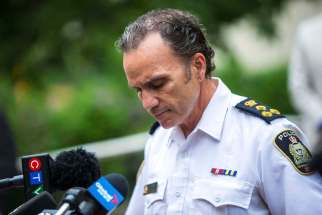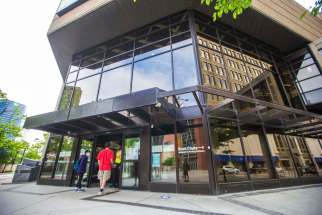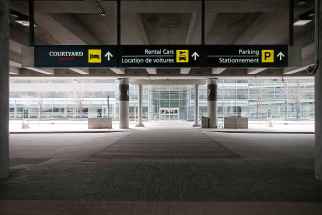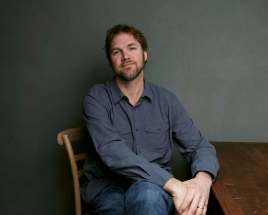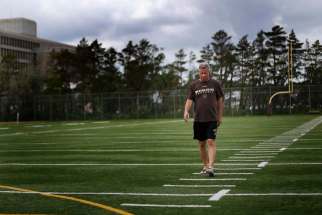Police chief throws support behind body camera rollout Implementation could cost as much as $10 million
Read this article for free:
or
Already have an account? Log in here »
To continue reading, please subscribe:
Monthly Digital Subscription
$0 for the first 4 weeks*
- Enjoy unlimited reading on winnipegfreepress.com
- Read the E-Edition, our digital replica newspaper
- Access News Break, our award-winning app
- Play interactive puzzles
*No charge for 4 weeks then price increases to the regular rate of $19.00 plus GST every four weeks. Offer available to new and qualified returning subscribers only. Cancel any time.
Monthly Digital Subscription
$4.75/week*
- Enjoy unlimited reading on winnipegfreepress.com
- Read the E-Edition, our digital replica newspaper
- Access News Break, our award-winning app
- Play interactive puzzles
*Billed as $19 plus GST every four weeks. Cancel any time.
To continue reading, please subscribe:
Add Free Press access to your Brandon Sun subscription for only an additional
$1 for the first 4 weeks*
*Your next subscription payment will increase by $1.00 and you will be charged $16.99 plus GST for four weeks. After four weeks, your payment will increase to $23.99 plus GST every four weeks.
Read unlimited articles for free today:
or
Already have an account? Log in here »
Hey there, time traveller!
This article was published 08/06/2020 (2015 days ago), so information in it may no longer be current.
OTTAWA — Winnipeg police and councillors on their oversight board are supporting a new push by Prime Minister Justin Trudeau to get officers wearing body cameras.
But a local criminologist argues the $8-million to $10-million cost would be better spent diverting people from crime in the first place.
Trudeau told reporters Monday that he had asked the head of the RCMP about the feasibility of requiring officers to wear body cameras, and will push the premiers to have city police do the same.
His comments come in the wake of widespread unrest over allegations of police brutality in Canada and the United States. In Winnipeg, police killed three Indigenous people in a 10-day period in April.
“Body cameras are a significant step towards transparency,” Trudeau said Monday. “It is something that is, in my opinion, what we need to move forward with.”
City council approved a body-camera pilot project in 2015, but scrapped it ahead of its 2017 start in a last-minute budget crunch, Winnipeg Police Chief Danny Smyth noted Monday.
“I think we’re well beyond pilot projects,” he told reporters.
Smyth estimated it would cost $8 million to $10 million to roll out body cameras. He said some companies provide cameras for free, but the city would have to pay for data storage and processing.
“That’s an expensive undertaking, but that’s not an excuse not to do it,” Smyth said.
Councillor Kevin Klein, chairman of the police board, said he wants to see body cameras implemented quickly.
“We can’t wait; you can’t play politics with this,” said Klein, who pledged to put forward a motion at the next meeting of the Assiniboia community committee to get the public service to report back on the cost and logistics.
However, Mayor Brian Bowman is against increasing this year’s police budget.
“The Winnipeg Police Board is tasked with aligning police service investments with community needs and should work with the Winnipeg Police Service within its existing resources to consider the use of body cams,” wrote Bowman spokesman Jeremy Davis.
The city could reduce its own vehicle fleet or forfeit property taxes from the WPS in order to pay for body cams, Klein said.
“We need to put our money where our mouth is to stop passing the buck,” he said.
Yet the chairwoman of the University of Winnipeg’s criminal-justice department said that money would be better spent on social supports.
“In the Winnipeg context I don’t think it makes any sense at all,” said Kelly Gorkoff. “The research is all over the map.”
The professor said there is no evidence body cameras actually reduce police brutality or mistreatment of visible minorities. Some research suggests cameras actually escalate tense situations.
Gorkoff said she couldn’t understand why Trudeau would call for a measure that puts even more money into policing, during protests calling for diverting those budgets to mental health, addictions and community-safety programs like Bear Clan Patrol.
“Research does consistently show that if you put money into youth programs, crime rates go down,” she said.
Gorkoff added that paramedics and social workers don’t wear body cameras, and argued that prescribing them to police puts them further away from front-line support and closer to a soldier-type role.
“That direction in my mind is a further militarization,” Gorkoff said. “It just seems like another toy or tool in the arsenal.”
Yet Winnipeg’s first black city councillor, Markus Chambers, said the move would be mutually beneficial.
“Whether it’s a false accusation or whether it’s a true instance of brutality; it protects both sides,” said Chambers, the deputy mayor who sits on the WPS board.
“It provides better transparency and greater accountability.”
Premier Brian Pallister was noncommittal.
“Decisions about compulsory equipment for police would require consultations including with the law enforcement agencies,” wrote spokeswoman Olivia Billson. “We welcome the dialogue on the use of body cameras.”
The Assembly of Manitoba Chiefs called for body cameras in April after Winnipeg police shot and killed three Indigenous people, while the Independent Investigation Unit says it could use recordings as evidence when assessing whether police have acted appropriately.
— with files from Joyanne Pursaga
dylan.robertson@freepress.mb.ca


